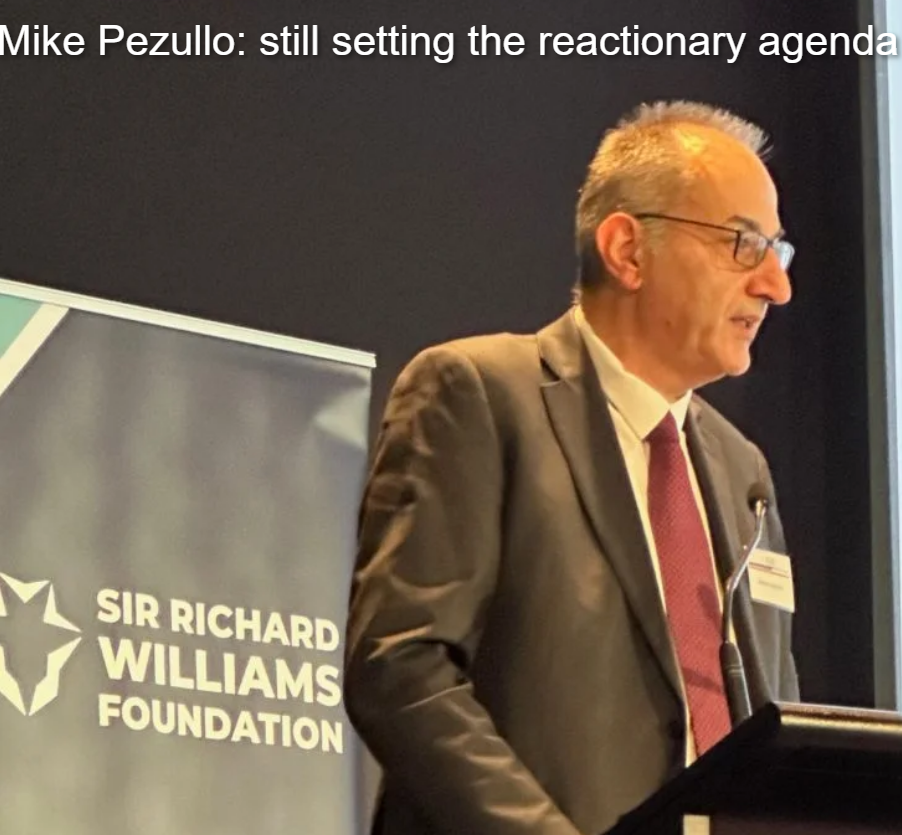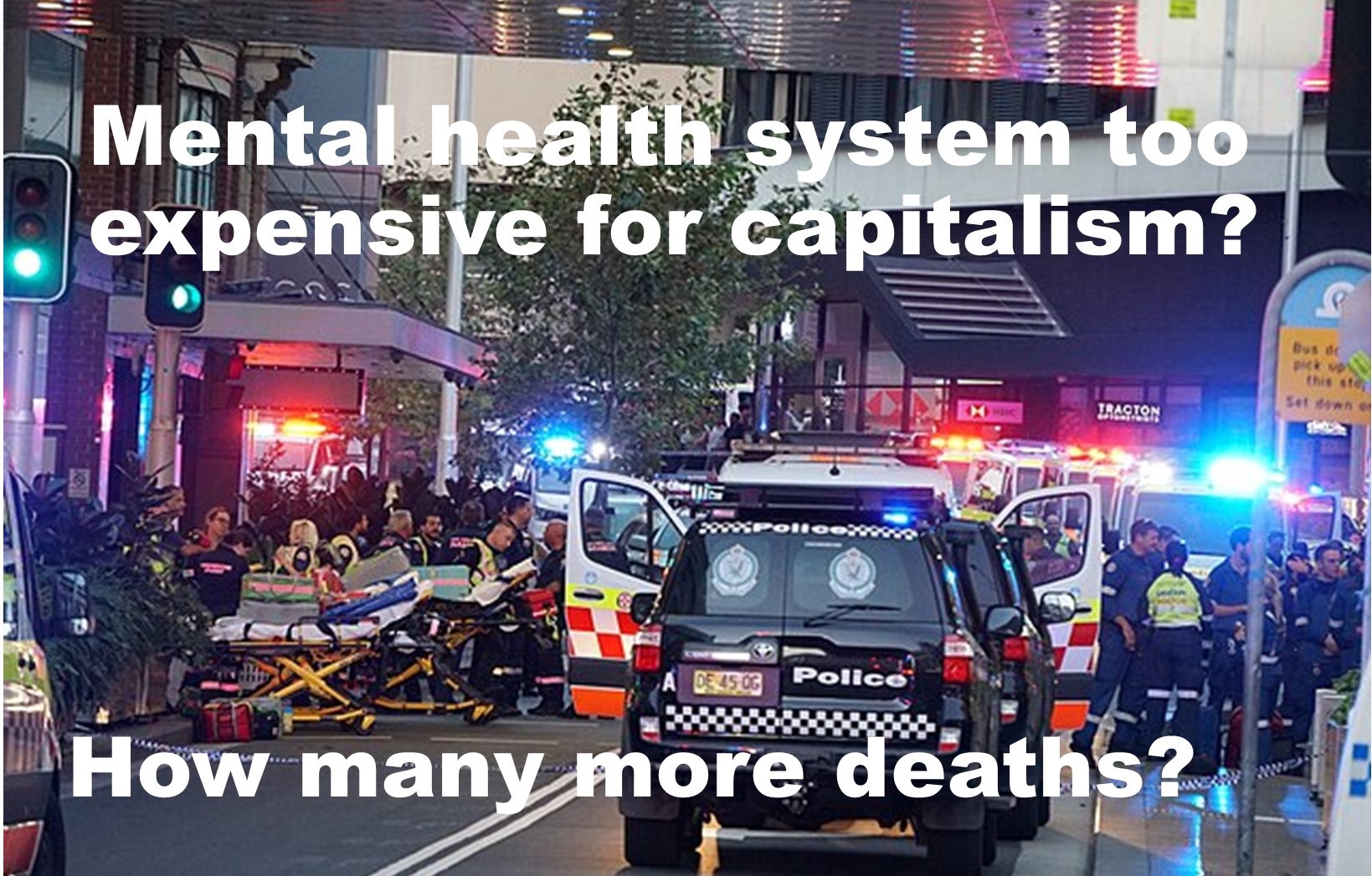Written by: (Contributed) on 28 April 2024

The release of a report from a right-wing defence and security lobby organisation with strong links to the military-industrial complex was timed to coincide with the release of the government’s 2024 National Defence Strategy in Canberra. Military planners appear to be considering a return to civil defence provision along similar lines to that used in the previous Cold War. Sensitive military documents from the period, which were subsequently declassified, have revealed some areas of serious concern; the same problems are now set to reappear in contemporary Australia.
In April, the Sir Richard Williams Foundation released a report calling for a return to civil defence provision similar to that used in Australia during the previous Cold War. (1) While the main part of the plan was presented as the defence and security of Australia, the hidden agenda was clearly something else; it provided a chilling picture of shadowy, clandestine organisation, preoccupied with intelligence-gathering and covert operations.
The report, in fact, actually specified that the 'defence of the Australian theatre would be a higher priority than sending our forces abroad'. (2)
The Williams Foundation was named after Sir Richard Williams (1890-1980), a well-known Australian military figure, and from its official web-sites prides itself on 'independent and innovative thinking'. In reality, it is something else; a high-pressure defence and security lobby organisation inside the corridors of power, with strong links into the military-industrial complex. Multinational armaments manufacturers dominate. Lockheed Martin is a platinum corporate partner; Northrop Grumman and Raytheon are gold corporate partners; Boeing is a silver corporate partner; CAE Inc. (formerly Canadian Aviation Electronics) is a bronze corporate partner; while corporate sponsors include General Atomics Aeronautical and BAE Systems.
The Foundation’s website claims “The Sir Richard Williams Foundation conducts its operations independently and has no political or industry ties.” Yet its Board members have numerous political roles and actively work for companies including its multinational sponsors. The Board comprises:
• Air Marshal (Retd) Geoff Brown AO. He was operational commander of the RAAF during the illegal war on Iraq after which he became a Director of Lockheed Martin (Australia), and Chairman of the Advisory Board of CAE Asia Pacific and Middle East.
• Air Chief Marshal (Retd) Mark Binskin who was recently appointed by the Australian Government to advise on Israel’s response to its murder of Zomi Frankon and other aid workers in Gaza. Since his retirement he has worked as a Non-Executive Director with BAE Systems Australia and Nihon Cyber Defence.
• Ken Moore, a former top public servant who is a graduate of the Advanced Management Program at the INSEAD Business School in France and the Senior Defence Resource Management Program at the US Navy Postgraduate School in California.
• Nicole Quinn, head of a government advisory company whose clients include Mitsubishi Motors (Australia), CAE and NEC Australia. She was previously General Manager of the regional security think tank the Institute for Regional Security.
• Vice Admiral (Rtd) Tim Barrett
• John Conway, who commanded the United Kingdom’s largest Permanent Joint Operating Base at RAF Akrotiri in Cyprus between 2005 and 2008 enabling the airbridge into Iraq and Afghanistan. He is the owner and Managing Director of Felix, an independent company providing specialist air domain and intelligence capability development, and creative services to Defence and industry. He was previously a business development executive with Raytheon Australia.
• Gerard Foley, the Chief of Growth for Raytheon Australia where he has worked for the last 22 years.
• Emily Frizell who owns a successful engineering and management specialist consulting company, AeroPM, which is a specialist service provider supporting Defence to acquire complex assets to support the warfighter.
• Major General (Retd) Fergus "Gus" McLachlan. He was awarded the United States Legion of Merit for his service in the international coalition force in Afghanistan. He is a Senior partner at Bondi Partners, founded in Washington DC in early 2020 by former Australian Ambassador to the United States, Joe Hockey. Its website states “With the evolution of AUKUS – a trilateral security pact between Australia, the U.K. and the U.S. – Bondi Partners footprint continues to grow across the Pacific and the Atlantic. Today we have teams in Washington, Los Angeles, Sydney, Canberra and London where we partner with businesses which want to grow and invest across allied and global markets.”
• Air Vice-Marshal (Ret’d) Steve Roberton is a full-time senior advisor with US multinational McKinsey and Company.
• Katherine Ziesing, Strategic Communications Manager at South Korean Hanwha Defence Australia.
While great play has been made in the report to the seeming vulnerability of Australia to attack, plans for the new proposed civil defence organisation to deal with 'social cohesion, domestic security and public safety', should not be taken literally. (3)
The discredited reactionary and former senior public servant, former Australian Secretary of Home Affairs, Mike Pezzullo, spoke at a Williams Foundation seminar on April 11, He said “With very little notice the Australian Defence Force could be called upon to undertake rapid deployments into the nearby arc of small states. While necessary and important, such ventures would only be marginally relevant to today’s great issues of war and peace.”
He added that “the threats in front of Australia now needed to drive a re-set in efforts that considered the engagement of the society in its own defence”.
“Now as a practical suggestion to focus relevant effort, we should consider modernizing the earlier practice from the 1930s and then again from the 1950s of the preparation of a war book. The war book of those times were guides on what would need to be done and by whom, in the event of war. Preparing a new war book would help to focus the national mind.”
“A new war book would deal with the entire span of civil defense and mobilization which would be required to move to a war footing… All one has to look around you and find the activity of the multi-polar authoritarian world and the end of the American-led “rules-based order” to understand the future is now.” (4)
The earlier War Books
In all cases a common pattern of government and military policies included the closure of anti-fascist civil defence provision activated during the Second World War and subsequent re-establishing of similar provision in the late 1940s and 1950s with recruitment of 'safe' anti-communists. (5)
At a meeting of the NATO Confederation of Reserve Officers in Westminster in August 1948, a decision was taken to lobby for a revival of a civil defence capacity for Western Europe. A 'representative from the British Territorial and Army Volunteer Reserve told the meeting it is not the case of training a force to be kept in reserve doing nothing while waiting for a war that might never happen. It has a useful function during civil emergencies'. (6)
While Australia was not a NATO member, its links with the British Commonwealth served a similar purpose.
The War Book issued in 1957 took place when Australia was governed by a right-wing Menzies administration which followed US-led Cold War military policy. Publications from the period leave little to the imagination. Those associated with the War Book were the most aggressive side of the business-classes. The main plan was to control civil society and channel political opposition; the main achievement of those concerned was to split the ALP and render it politically unable to win federal elections for decades. Trade unions, likewise, were subject to constant vilification.
Reviving conscription?
One of the main perpetrators behind the thinking outlined in the recent report is James Paterson, Opposition Home Affairs and Cyber Security spokesman. He is not a quiet, thoughtful individual. Addressing the annual ANZAC Oration at the Robert Menzies Institute in Melbourne, he warned 'that urgent action is needed to bolster the ADF and address a workforce crisis'. (7)
The new proposed civil defence provision would appear part of the same package. The Liberals, likewise, have long toyed with the return of conscription on the basis of social cohesion, terminology used specifically in the report.
Similar references can also be found in the main National Defence Strategy 2024 publication which contains an emphasis on the fear of subversion without specifically using the terminology categorically. (8) Emphasis is also placed in the publication on supply-lines and Australian industry. (9)
While stated aims remain, political agendas, however, can easily be hidden.
The main enemy of Australians during the previous Cold War was not the Soviet Union but the 'enemy within': anti-communist far-right organisations developed strong links with those wielding class and state power. The far-right National Civic Council, for example, 'was approached by Australia's spy-chiefs when the possibility of their anti-communist crusade became apparent to ASIO and allied authorities'. (10) The NCC counterpart, the Australian League of Rights (ALOR), likewise, also retained similar links and as the Australian affiliate to the notorious World Anti-Communist League was an advocate of civil defence. (11)
The subsequent demise of the Soviet Union in 1990 resulted in vast troves of western defence and security documents from the Cold War suddenly being declassified. Plausible denial was then not possible for those wielding class and state power.
During the mid-1960s, for example, the US military began upgrading training manuals for counter-insurgency and counter-intelligence programs. One program, Project X, included provision for 'aerial surveillance, eavesdropping, interrogation, basic counter-sabotage measures, hiring and firing informants, lock picking and censorship'. (12) It was used through intelligence agents infiltrating 'a wide array of groups, including political parties, labour unions, youth and student groups, religious organisations, and publishing organisations … one manual even cast suspicion on the electoral process. Insurgents can resort to subversion of the government by means of elections'. (13)
During the early 1970s the US began 'exporting Project X material to US military assistance groups working with friendly foreign countries. By the mid-1970s the Project X material was going to military forces all over the world'. (14) A noticeable trend with the US military assistance was channelling expertise through seemingly out-sourced private organisations, created to enable the US to use plausible denial if challenged. Studies of the matter have, however, shown that many of those operations during the previous Cold War were 'CIA sub-contracts'. (15)
Due to Australia's close military alliance with the US, there is every reason to expect the training material to have been incorporated into Australian Defence Force provision. In fact, ADF training manuals from the same period include similar provision. (16) Military biographies from the previous Cold War provide more than adequate evidence that the US used Australia as a convenient hub for 'US interests' in the wider region from soon after the end of the Second World War. (17)
A common pattern with the military training included use of civil defence organisation for a variety of purposes including general surveillance of civilian populations where lists were drawn up following profiling together with the use of paramilitary groups. (18) There was little ambiguity in the eyes of the Pentagon as to whom were the targets: one training manual noted the co-ordinated counter-intelligence activities worldwide were against those who oppose the US Defence Department 'during peacetime and all levels of conflict'. (19)
Those associated with the Williams Foundation who lurk inside the corridors of power lobbying for civil defence provision are pursuing a Cold War hidden agenda in support of the US military-industrial complex and a return to the same problems of yesteryear.
We need an independent foreign policy!
1. Credible chance of war: Why we must plan for attack, Australian, 19 April 2024.
2. Ibid.
3. Website: Williams Foundation.
3. Australian, op.cit., 19 April 2024.
4. Ibid.
5. See: NATO Secret Army's, Daniele Ganser, (2005); and, Secret Army's war on the Left, The Observer, (London), 18 November 1990.
6. NATO and civil emergencies, State Research, Bulletin 1, October 1977, page 9.
7. Libs' Defence prescription to head off future conscription fight, Australian, 23 April 2024.
8. See: National Defence Strategy 2024, (Canberra, 2024), on-line book, page 18.
9. Ibid.
10. Benign spy-master built global network, The Age (Melbourne), 3 March 1998.
11. See: The Australian League of Rights, Andrew A. Campbell, (Victoria, 1978); and, Voices of Hate, K. D. Gott, (Melbourne, July 1965); and, Inside the League, Scott Anderson and Jon Lee Anderson, (New York, 1986), Appendix, The League List, pp. 275-85; and, Ted Serong, The life of an Australian counter-insurgency expert, Anne Blair, (Melbourne, 2002), pp. 186-192.
12. Army's Project X had wider audience, The Washington Post, 6 March 1997.
13. Ibid.
14. Lost History: Project X, The Consortium magazine, 31 March 1997.
15. Inside the League, op.cit., page 305, footnote 18.
16. See: The Division in Battle, Pamphlet Number 1, Organisation and Tactics, Military Board, Army Headquarters, Canberra, 1 June 1966; and, Infantry Training, Volume 4, Part 2, Army Headquarters, Canberra, 1 May 1967.
17. See: Ted Serong, Blair, op.cit., pp. 73-203.
18. Washington Post, op.cit., 6 March 1997; and, Counter Insurgency Operations, US Army, Army Foreign Intelligence Assistance, ref: 19960709 052; and, US Army Regulation, 381-20, The Army Counter-Intelligence Program, declassified 15 November 1993.
19. US Army Regulation 381-20, ibid., Section 1.5, Mission and Policy, page 1; and, see also, US Army Field Manual 30-31, Appendix B, about the controversy surrounding those associated with civil defence type provision and the far-right and terrorism.
 We are reprinting the font page of the paper Vanguard to be distributed free of charge at May Day rallies. The entire paper can be downloaded by clicking the link "Latest Publications" on the left hand side of our homepage. Our Party's statement follows:
We are reprinting the font page of the paper Vanguard to be distributed free of charge at May Day rallies. The entire paper can be downloaded by clicking the link "Latest Publications" on the left hand side of our homepage. Our Party's statement follows:





